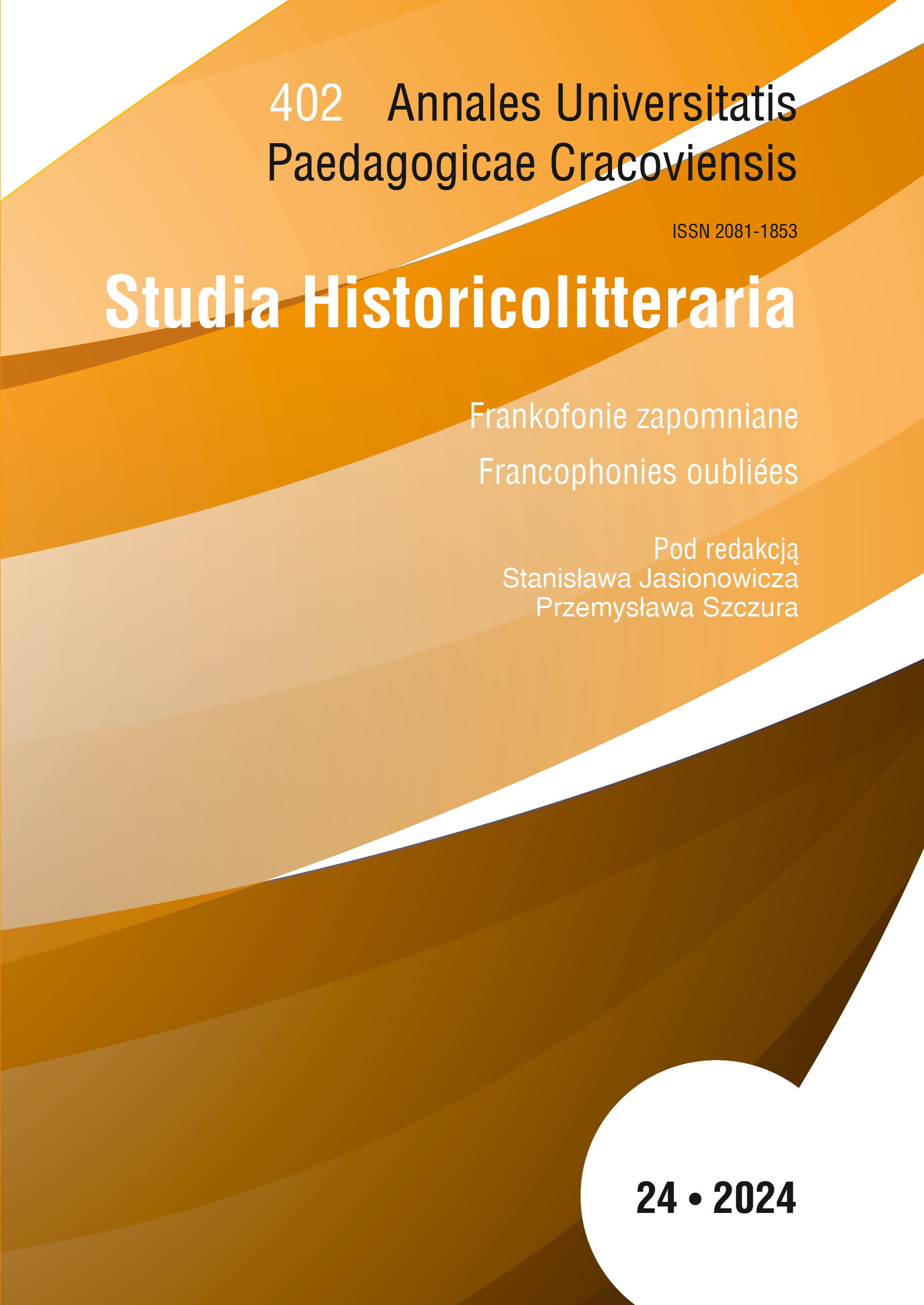Malaquais, the flowering of time
Main Article Content
Abstract
Malaquais (1908–1998) occupies an original place in the aesthetics of the « talking novel » in France. Instead of looking for simplicity to account for the social reality he knows, he seizes the language in all its richness, going so far as to refine it, to practice a form of skin-deep preciousness. The construction of his novels, the segmentation of a narrative which is played out and plays on all the registers express his internationalist conception of the world in a lyrical language that gives as much to feel as to see, reflects the revolt, translates emotions into incoherence. Like a Montaigne who sought by his style to approach the complexity of his time as much as possible, Malaquais will rewrite his works in the 1980s, pursuing his requirement for a constantly moving writing that follows the march of the world.
Downloads
Article Details

This work is licensed under a Creative Commons Attribution-NonCommercial-NoDerivatives 4.0 International License.
COPYRIGHT POLICY
The publisher of "Annales Universitatis Paedagogicae Cracoviensis.Studia Historicolitteraria" is authorised to use and distribute all the materials published in the journal on the basis of a non-exclusive licence agreement unlimited in time – previously concluded for an indefinite period of time each time with the author of a specific paper in the fields of exploitation specified in the agreement.
OPEN ACCESS POLICY
"Annales Universitatis Paedagogicae Cracoviensis.Studia Historicolitteraria” is an open access journal, and all its contents are available for free to users and/or their institutions on the basis of non-exclusive licenses under Creative Commons (CC BY CC-BY-4.0). Users can read, download, make copies, distribute, print, search, or to link to full text articles in this journal without the prior permission of the publisher or the author.This is consistent with the definition of open access BOAI (http://www.soros.org/openaccess).
References
Aderhold C., Heureux comme Dieu en France, https://www.historia.fr/%C2%AB-heureux-comme-dieu-en-france-%C2%BB (consulté le 19.08.2024).
Bourin A., Instantanés Jean Malaquais, « Les Nouvelles littéraires », 23.10.1947, n°1051, p. 6.
Bourin A., Le romancier exprime l’angoisse de vivre, « Les Nouvelles littéraires », 30.10.1947, n° 1052, p. 2.
Bozon-Verduraz A., La Flamme du soldat méconnu, « Télérama », 4.06.1997, n°2473, p. 47.
Brincourt A., Langue française terre d’accueil, Paris 1997.
Compagnon A., Le Démon de la théorie. Littérature et sens commun, Paris 1998.
Correspondance entre André Gide et Jean Malaquais.1935–1950, Paris 2023.
Dos Passos J., Manhattan Transfer, Paris 1973.
Eppelbaum D., Jean le métèque, [dans:] idem, Les Enfants de papier, Paris 2002, p. 190–196.
France-Culture, « Mémoires du siècle », 30.08.1996.
Godard H., « Les Javanais » de Jean Malaquais roman des sans-papiers et de leurs langues natales, [dans:] idem, Une grande génération. Céline, Malraux, Guilloux, Giono, Montherlant, Malaquais, Sartre, Queneau, Simon, Paris 2003, p. 359–371.
Gombrowicz W., Journal. 1953–1956, Paris 1981.
Górny M. et Piégais G., Pologne, 1920: Les espoirs de propager la révolution vers l’Europe centrale étaient grands, selon Maciej Górny, « Le Courrier d’Europe centrale », 9.08.2020, https://courrierdeuropecentrale.fr/pologne-1920–les-espoirs-de-propager-la-revolution-vers-leurope-centrale-etaient-grands/ (consulté le 19.08.2024).
Higgins G., Les Conrad français, « Les Nouvelles Littéraires », 6.04.1940, n° 912, p. 4.
Jennings E., Les Bateaux de l’espoir. Vichy, les réfugiés et la filière martiniquaise, Paris 2020.
Mailer N., Un hommage à Jean Malaquais, [dans:] J. Malaquais, Planète sans visa, Paris 1999, p. 17–24.
Malaquais J., La Courte Paille, Paris 1999.
Malaquais J., Marseille, cap de Bonne-Espérance, « Pour la Victoire », 6.03.1943, p. 7.
Malaquais J., El Rebelde (Romance de antaño), scénario, Mexique, 1943, 118 mn. Mise en scène Jaime Salvador. Production : Águila Films, Oscar Dancigers. Adaptation: Jean Malaquais et Jaime Salvador.
Malaquais J., Le Gaffeur, Paris 2001 [1953].
Malaquais J., Les Javanais, Paris 1998 [1939].
Malaquais J., Journal de guerre suivi de Journal du métèque, Paris 1997.
Malaquais J., Planète sans visa, Paris 1999 [1947].
Malaquais J., Sören Kierkegaard: foi et paradoxe, Paris 1971.
Moreau L., « Né rebelle dans le ventre de sa mère », Jean Malaquais n’en profite jamais, « La Rue », 01.1996, n°25, p. 15.
Nakach G., Malaquais rebelle, Paris 2011.
Rabourdin D., Entretien avec Jean Malaquais, 20.02.1996.
Rousselot J., Une fresque prophétique. Planète sans visa, « Caliban », 12.1947, n° 10, p. 7.
Siostrzonek P., Planeta bez praporů a bez víz, « Kapital », 2023, n° 3, p. 28–29.
Thiébaut, M., Parmi les livres, « Revue de Paris », 02.1948, n° 2, p. 164–166.
Trotski L., Ma vie, trad. M. Parijine, Paris 1973.
Trotski L., Un nouveau grand écrivain: Jean Malaquais, [dans:] idem, Littérature et révolution, Paris 1964, p. 333–334.
Trotski L., Un livre remarquable. Lettre du 19 juin 1939, [dans:] idem, Œuvres, t. 21, Paris 1986, p. 226.
Trotski L., Faire connaître le roman. Lettre du 9 août 1939, [dans:] idem, Œuvres, t. 21, Paris 1986, p. 380.
